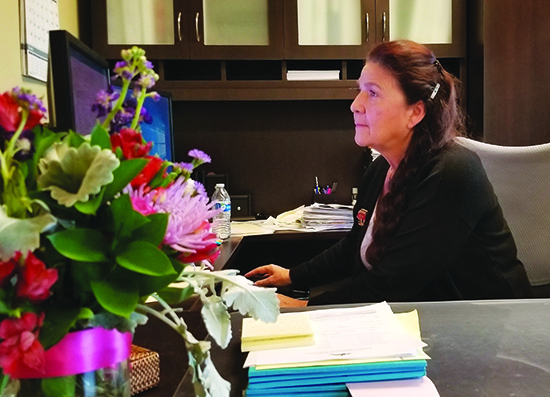By Niki Cleary, Tulalip News
At 3:30p.m. on her last Friday, Interim CEO Debra Posey is still hard at work sending emails, taking phone calls and squeezing in a little time for an interview about her efforts over past several months.
“I came here out of retirement and I’ll go back to retirement,” said Deb. “I received a call from the tribal council asking if I would help them out and come in on an interim basis, they were doing a re-org. I was absolutely thrilled.
“I’m so grateful to have had that opportunity. I’ve spent every day since I’ve been here trying to find ways to improve the lives of our people. We are a community that has a lot of needs. People make assumptions that we are doing fine, there are a lot of our people who aren’t doing fine.”
Deb served her tribe off and on in many capacities throughout her life, both as an employee and as a Board of Director. Regardless of her capacity, she explained that she always leads from a strong foundation of cultural teachings and a sense of community. Work ethic and compassion, she disclosed, were instilled in her from a young age.
“I remember when I first started work at the tribe, I was 17,” reminisced Deb. “I was a horrible employee, habitually late. My auntie D called me in and said, ‘You are so fortunate to have this job, so many of our people don’t have jobs. But I need you to be to work on time and work hard when you are here. Can I count on you Debbie?’ I wanted so hard to please her and I had so much love in my heart for her. I said ‘Yes, Auntie, I’ll try harder.’
“To remember starting the tribe at 17,” she continued, “and to be leaving as an interim in the CEO office, wow! Thank you for this amazing opportunity.”
Although she didn’t set down formal goals when she accepted the position of Interim CEO, Debra knew she wanted to make change.
“First and foremost, we are here to serve our people,” sad Deb. “That is the message I got my whole life. We [indigenous people] are unique in this way. That’s how we got this far and that’s how we will continue on. We are here to help each other.
“There are punitive policies that have adversely affected the lives of our people,” explained Deb. “We need to change that. I don’t know how they came to be, but they are not who we are culturally or traditionally. I’ve worked really hard with Helen Gobin Henson and other staff to create policies that are more sensitive to who we are as native people. We need to embrace our people. We need to bring love back into this community. We need to understand that everybody has value.”
Deb shared a story of a member affected by homelessness. Despite the circumstance, she pointed out that he made an effort to take care of the reservation in a small way, by cleaning up the litter around his homeless encampment. She pointed out another scenario in which a young mother, unable to pay her PUD bill, was facing the onset of the cold season without electricity.
“When we [Tulalip Tribes] were poor, our people still had houses,” she pointed out. “We didn’t have this homelessness problem. We’ve always been able to take care of our people. For me to sit across the table from someone and be able to use the resources of the tribe to help them share in this great life is an amazing privilege.”
She worries that the way the tribe’s policies are written is a symptom of the widening disconnect in our community.
“When you look at someone in need and can say that they made their choices and created this problem, they can live with it. When you can look at a homeless member, or someone who is affected by addiction, or a young mom with kids who aren’t going to have food or heat and you’re not moved to help them, that is not who we are. When you don’t have a heart for our people is when you’ve truly assimilated.”
Debra praised the tribal employees who come to work every day with a mindset of service.
“We need people who come into these positions to have a heart for our membership. The thing that makes me someone who can make a difference here is the teachings I have and the tenderness I have for our members. We have got to be here for each other and we have got to be supportive of each other. It got us this far and it will sustain us if we understand that.”
For incoming leadership, Debra’s advice is to be the kind of person who sees individuals instead of numbers.
“I would like them to listen to the people when they come in. Hear their voices. Look them in the eye and see what their needs are and what we can do to help. Create more opportunity and help our people share in the prosperity that this tribe is experiencing.”
By 4:00 p.m., Debra excused herself and walked briskly to the finance department.
“I have until 5:00p.m,” she said, “and I’m going to help some people.”
